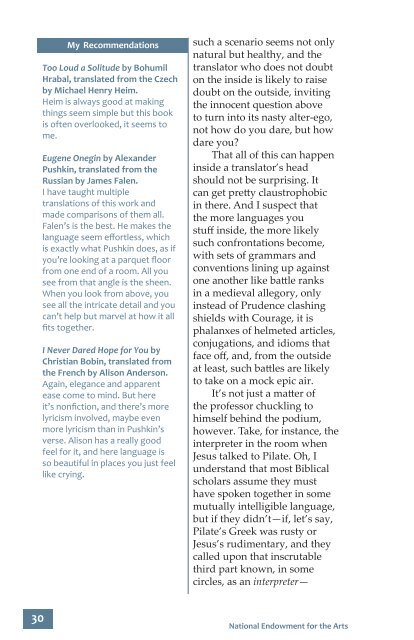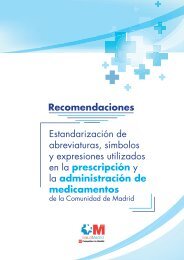lKd7nD
lKd7nD
lKd7nD
Create successful ePaper yourself
Turn your PDF publications into a flip-book with our unique Google optimized e-Paper software.
My Recommendations<br />
Too Loud a Solitude by Bohumil<br />
Hrabal, translated from the Czech<br />
by Michael Henry Heim.<br />
Heim is always good at making<br />
things seem simple but this book<br />
is often overlooked, it seems to<br />
me.<br />
Eugene Onegin by Alexander<br />
Pushkin, translated from the<br />
Russian by James Falen.<br />
I have taught multiple<br />
translations of this work and<br />
made comparisons of them all.<br />
Falen’s is the best. He makes the<br />
language seem effortless, which<br />
is exactly what Pushkin does, as if<br />
you’re looking at a parquet floor<br />
from one end of a room. All you<br />
see from that angle is the sheen.<br />
When you look from above, you<br />
see all the intricate detail and you<br />
can’t help but marvel at how it all<br />
fits together.<br />
I Never Dared Hope for You by<br />
Christian Bobin, translated from<br />
the French by Alison Anderson.<br />
Again, elegance and apparent<br />
ease come to mind. But here<br />
it’s nonfiction, and there’s more<br />
lyricism involved, maybe even<br />
more lyricism than in Pushkin’s<br />
verse. Alison has a really good<br />
feel for it, and here language is<br />
so beautiful in places you just feel<br />
like crying.<br />
such a scenario seems not only<br />
natural but healthy, and the<br />
translator who does not doubt<br />
on the inside is likely to raise<br />
doubt on the outside, inviting<br />
the innocent question above<br />
to turn into its nasty alter-ego,<br />
not how do you dare, but how<br />
dare you<br />
That all of this can happen<br />
inside a translator’s head<br />
should not be surprising. It<br />
can get pretty claustrophobic<br />
in there. And I suspect that<br />
the more languages you<br />
stuff inside, the more likely<br />
such confrontations become,<br />
with sets of grammars and<br />
conventions lining up against<br />
one another like battle ranks<br />
in a medieval allegory, only<br />
instead of Prudence clashing<br />
shields with Courage, it is<br />
phalanxes of helmeted articles,<br />
conjugations, and idioms that<br />
face off, and, from the outside<br />
at least, such battles are likely<br />
to take on a mock epic air.<br />
It’s not just a matter of<br />
the professor chuckling to<br />
himself behind the podium,<br />
however. Take, for instance, the<br />
interpreter in the room when<br />
Jesus talked to Pilate. Oh, I<br />
understand that most Biblical<br />
scholars assume they must<br />
have spoken together in some<br />
mutually intelligible language,<br />
but if they didn’t—if, let’s say,<br />
Pilate’s Greek was rusty or<br />
Jesus’s rudimentary, and they<br />
called upon that inscrutable<br />
third part known, in some<br />
circles, as an interpreter—<br />
30<br />
National Endowment for the Arts



